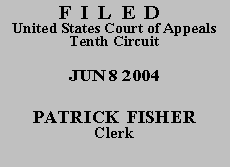

| GARY CAPSHAW,
Petitioner-Appellant, v. SCOTT ABBOTT, Warden, Wyoming State Penitentiary; ATTORNEY GENERAL OF THE STATE OF WYOMING, Respondents-Appellees. |
|
Gary G. Capshaw appeals the district court's denial of his 28 U.S.C. § 2254 habeas petition. Capshaw was convicted of two counts of possession of a controlled substance with intent to deliver, and one count each of possession of a controlled substance in an amount exceeding three grams and conspiracy to deliver a controlled substance in violation of Wyoming Statutes §§ 35-7-1031 and 35-7-1042. His conviction was affirmed on appeal to the Wyoming Supreme Court. Capshaw v. State, 10 P.3d 560 (Wyo. 2000).
Capshaw filed a petition for state post-conviction relief; all claims in the petition were ultimately dismissed. Capshaw then filed his federal § 2254 habeas petition. The district court denied relief, but granted a certificate of appealability on the issue of: "whether the District Court for the Seventh Judicial District abused its discretion by delegating its decision to shackle Petitioner to the Natrona County Sheriff's Department." Aplt. App. at 142. We have jurisdiction pursuant to 28 U.S.C. §§ 1291 and 2253(a) and we affirm. I
Because the district court's order gives a thorough and detailed recitation of the facts, we will only set forth a brief background of the case. When Capshaw initially sought post-conviction relief, the state district court dismissed the petition. The Wyoming Supreme Court affirmed the dismissal on all claims, with the exception of Capshaw's claim that his due process rights were violated when he was shackled throughout his jury trial. The Wyoming Supreme Court reversed the state district court decision on that issue and remanded for further proceedings.
On remand, the state district court conducted an evidentiary hearing to determine if Capshaw had been unconstitutionally shackled during trial. At the hearing, Capshaw called a former juror to testify about Capshaw's appearance during the trial. The witness testified that he remembered Capshaw appearing in street clothes. Aplt. App. at 218. The state presented evidence regarding Capshaw's escape during his initial appearance in the case and his conviction for that escape. Id. at 222-230.
After the hearing, the court entered an order denying relief and made findings, including the following: 1) given Capshaw's previous escape from custody, his criminal history, and his status as a "high risk inmate," compelling reasons existed to justify the use of shackles during trial; 2) Capshaw failed to establish a violation of a constitutional right because there was no showing that he was viewed by the jury in shackles during the trial, and there was no showing of prejudice as a result of the use of the shackles. Id. at 206-07 ¶¶ 13, 17.
Capshaw petitioned for review to the Wyoming Supreme Court. That court denied the petition, affirming the findings of the state district court because "there are a significant number of cases that find that shackling was justified as a result of a prior escape" and "this is not a case where the evidence shows that jurors actually observed the shackles during trial[;] . . . [i]nstead, this is a case where the materials do not establish that any jurors observed petitioner in shackles to his prejudice." Id. at 208 (citation omitted).
In response to Capshaw's federal habeas petition, the district court found that the state court's determination that Capshaw should be shackled because he was an escape risk was neither contrary to, nor an unreasonable application of, clearly established federal law. Capshaw also argued that the state district court was required to hold a hearing on the record before trial began and state its findings for the necessity of shackling. The district court noted that Capshaw never objected to being shackled before or during trial, and, as a result, no findings were made on the record regarding whether it was necessary to shackle Capshaw during trial. The district court concluded that although some federal circuit courts of appeal have expressed a policy that federal district courts should make findings of fact to justify shackling, the Supreme Court has never held that this preference is required by the Constitution.
II
In order to be entitled to habeas relief, Capshaw must demonstrate that the state court's decision was "contrary to, or involved an unreasonable application of, clearly established Federal law, as determined by the Supreme Court of the United States," or was "based on an unreasonable determination of the facts in light of the evidence presented in the State court proceeding." 28 U.S.C. § 2254(d)(1) & (2). Further, state court findings are presumed to be correct unless the petitioner rebuts this presumption by clear and convincing evidence. 28 U.S.C. § 2254(e)(1).
On appeal, Capshaw argues that clearly established federal law requires the trial court to make explicit findings on the record to justify shackling a defendant. Second, he argues that because the trial court effectively delegated the shackling decision to the Sheriff's Department, instead of exercising its own discretion, the Wyoming Supreme Court's determination that shackling was justified by a prior escape was based on an unreasonable determination of the facts and an unreasonable application of controlling federal precedent.
Our review of the appellate briefs, the record, and the applicable law, lead us to conclude that, for substantially the reasons stated in the district court's April 3, 2003 order, Capshaw has not established his entitlement to habeas relief. See 28 U.S.C. § 2254(d)(1) & (2). The judgment of the district court is AFFIRMED.
Entered for the Court
Circuit Judge
*. This order and judgment is not binding precedent, except under the doctrines of law of the case, res judicata, and collateral estoppel. The court generally disfavors the citation of orders and judgments; nevertheless, an order and judgment may be cited under the terms and conditions of 10th Cir. R. 36.3.